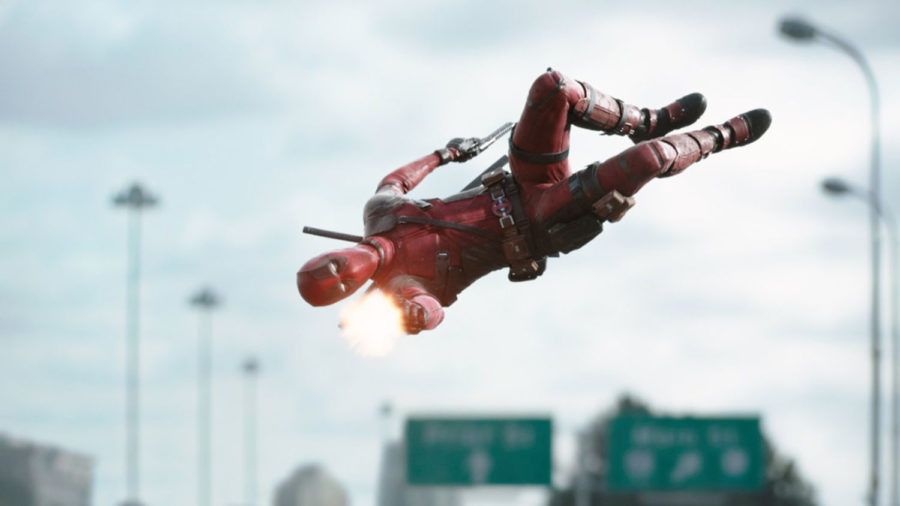How ‘Deadpool’ rose from Hollywood purgatory to make R-rated fun of your sacred superheroes
February 10, 2016
Every superhero’s story has its pivotal, then-everything-changed moment: a radioactive spider bite, a laboratory experiment gone awry, exposure to cosmic rays.
This one involves an Internet leak.
In late July 2014, nearly two minutes of old test footage from an offbeat and very R-rated movie called “Deadpool” mysteriously appeared on the Web. The story of a foul-mouthed, fourth-wall-breaking mercenary named Wade Wilson, who acquires self-healing powers after being diagnosed with terminal cancer. The film — which was to star Ryan Reynolds — had been languishing for more than a decade as 20th Century Fox sat on the oddball project, unsure what to do with it.
Advertisement
Comic book fans greeted the footage with wild enthusiasm. Movies like “Guardians of the Galaxy” pushed the boundaries of the superhero genre, but “Deadpool” — with its blend of self-awareness, ultraviolence, frequent F-bombs and bawdy sexual humor — promised to leap over them with anarchic abandon. Fan sites breathlessly declared the footage “amazing” and “perfect,” and Fox took notice. Two months later, the studio gave “Deadpool” its long-awaited green light.
“It’s like a fairy-tale story,” Reynolds said recently by phone from London, where he was promoting “Deadpool,” which hits theaters Friday. “That footage was never meant to be shown to the public in any way. But I think it’s exclusively the reason the film got made.”
In today’s Hollywood, superhero movies are generally no-brainer propositions for the major studios, which explains why seven of them are due in theaters this year alone. But “Deadpool” is a different kind of animal. While most superhero movies are fairly serious affairs, “Deadpool” is an irreverent mash-up of a comic-book film and a raunchy comedy that subverts and mocks the genre’s conventions at every turn.
Deadpool eviscerates bad guys with a kind of psychopathic glee rarely seen in superheroes. He goes out of his way to ridicule Fox and its most valuable comic-book franchise, the X-Men, and cracks sexual jokes that wouldn’t be out of place in a Judd Apatow comedy.
Deadpool has enjoyed a strong and growing cult following among comics aficionados ever since his introduction in Marvel Comics in 1991. But, in a way, “Deadpool” could only exist as a movie now that mainstream audiences have had the chance to fully absorb all the standard superhero-movie tropes. What some decry as the oversaturation of the multiplexes with comic-book blockbusters has created the perfect opening for this sort of genre-deconstructing palate cleanser.
Now the rest of the world is finally in on the joke “Deadpool” is delivering.
“‘Deadpool’ is very different — it’s not just the R rating or the violence or the tone and humor,” said Tim Miller, who is making his directorial debut with the film after years of working in visual effects. “I think its greatest strength is flipping the expectations the audience has for this kind of film and making fun of what has been a very self-serious genre. That couldn’t have happened before the audience had become familiar with comic-book films.”
Advertisement*
Comic-book artist Rob Liefeld, who created Deadpool, agrees.
“You can’t account for timing,” Liefeld said. “Since the movie was greenlit, Deadpool’s comic sales have tripled. He’s the right character at the right time.”
When Reynolds was first approached with the idea of playing Deadpool back in 2005, he had no idea who the character was.
“A certain executive I knew at the time kept saying, ‘If they ever make a Deadpool movie, you’re Deadpool,'” Reynolds said. “I kept saying, ‘What is Deadpool?’ I read the comics and, sure enough, I really connected to the world. I knew he was working off a different footprint than some of the other guys.”
In 2009, Reynolds appeared as Deadpool in a supporting turn in Fox’s 2009 “X-Men Origins: Wolverine,” but many fans were incensed when the character — nicknamed “The Merc with a Mouth” — had his mouth sewn shut. Soon after, screenwriters Rhett Reese and Paul Wernick (“Zombieland”) came onboard to write the script for a standalone “Deadpool” film, which fans hoped would better capture what made Deadpool unique.
However, executives at Fox balked at Deadpool’s relative obscurity and the movie’s anarchic comic tone, which seemed to clash with the studio’s more sober-minded and highly lucrative “X-Men” franchise.
With “Deadpool” seemingly dead in the water, Reynolds went off and starred in a different superhero movie, 2011’s ill-fated “Green Lantern.” The film earned scathing reviews and bombed at the box office, but Reynolds drew some lessons from its failure.
“‘Green Lantern’ was fundamentally doomed from the start because there wasn’t really a functioning script or identity for it,” Reynolds said. “A lot of these comic-book movies are world-building, and without a clear idea of what the movie is really saying, it’s not going to materialize according to your expectations. Going into ‘Deadpool,’ everyone was on the same page.”
In 2014, Simon Kinberg came onto the project as a producer to try to help nudge things along. Having worked on multiple “X-Men” films, Kinberg sought to persuade Fox that “Deadpool” could coexist with the rest of that franchise.
“The tone of ‘Deadpool’ is almost the opposite of the mainline ‘X-Men’ movies,” said Kinberg. “It was a pretty bold leap of faith for them to take.”
The enthusiastic fan reaction to the leaked test footage gave Fox the confidence to make that leap. Still, the studio hedged its bets somewhat by making “Deadpool” on a relatively lean budget, just a fraction of what would be spent on a massive tentpole superhero movie like “The Avengers” or the upcoming “X-Men Apocalypse.” The low production cost required a few sacrifices (two additional villains in the original script were cut), but it ultimately allowed the “Deadpool” team the creative license to make the film it wanted to make, R rating and all.
Reynolds insists he didn’t leak the “Deadpool” test footage. At this point, the actor, who turns 40 this fall, is mostly just relieved the movie got made before he aged out of the superhero game.
“I’m glad we made it now while I can still run, jump, shoot and be a wiseass,” he said. He paused a Deadpool-esque beat. “If it took another 15 years, we’d have to have the whole movie take place during one of Deadpool’s colonoscopies.”
___
(c)2016 Los Angeles Times
Visit the Los Angeles Times at www.latimes.com
Distributed by Tribune Content Agency, LLC.
Advertisement








